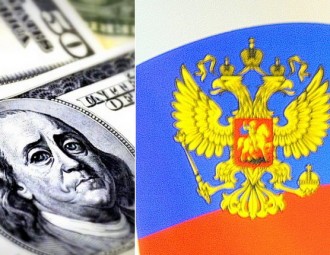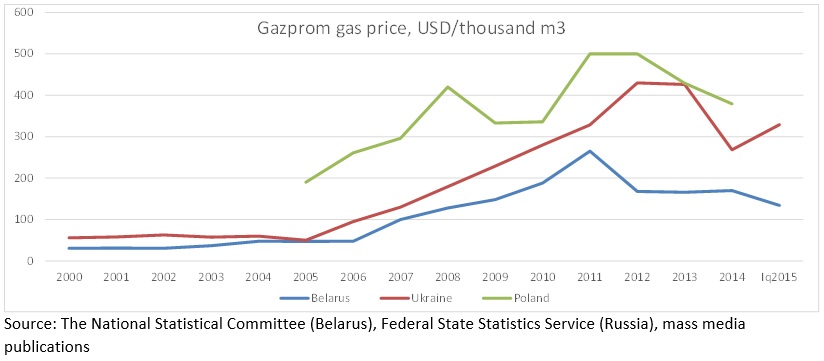Will something change in the established order where Russia has always been there for Belarus?

No other country or regional union could give to Belarus as much as Russia. Over the last two decades Russian subsidies reached around 15% of Belarusian GDP annually, writes Ales Alachnovich.
On 24 August, the Brent oil price fell to $43, which was close to a 7-year low. Although Belarus has not got its own crude oil, this is terrible news for its economy. The cheaper the oil, the lower are benefits from the energy subsidies to Belarus from Russia.
Over the last 20 years Belarus has maintained, relatively successfully, a quasi-socialist economy mostly thanks to the generous economic aid from Russia. Under Lukashenka’s rule Russia's unprecedented economic support has amounted to a dozen or so percent of Belarusian GDP annually. But the decline in the world oil and gas prices limits the benefits for Belarus.
The cheapest oil and gas prices in the region
Both government and non-government economists agree that Belarus benefits from a good relationship with Russia. For instance, in 2012 due to favourable energy prices Belarus saved $10 billion or 16% of GDP, according to the Economic Institute of the Belarusian National Academy of Sciences. Using the same methodology would suggest that the average level of Russian subsidies over the last two decades reached the equally incredible level, around 15% of Belarusian GDP annually.
Belarus has the lowest gas price in the region, apart from Russia itself. Until 2007 the gas price was three-to-five times cheaper than for Poland. Then, Russia gradually raised the price for Belarus while still offering Belarus the best deal in the region. In 2014 gas for Belarus cost $170 per 1,000 m3 which is 55% less than for Poland. If Belarus were to pay the market-based price similar to the one Poland pays it would cost it almost $4.2 billion more or 5.5% of its GDP.

In addition, Belarus takes advantage of duty-free oil for its own needs, saving another one or two billion dollars annually. For example, in 2014 Belarus bought one ton of crude oil for $395, only 55% of the average world price, which meant over $2 billion of savings (2.7% of GDP) throughout the year.
Decreasing grant from petroleum products
With hardly any oil resources inside the country, Belarus belongs to the Top-10 net exporters of petroleum products in the world, according to the International Energy Agency. Until 2007 Belarus imported duty-free crude oil at a price close to the Russian domestic one and processed it at its two refineries. Belarus used a third for domestic needs and exported the rest to the West at market prices. This profit added several billion dollars a year and boosted the ineffective economy.
When the Kremlin wishes some concessions from Lukashenka, it often engages its energy leverage. Since 2007 Russia tried to conduct more market-oriented economic relations with Belarusin the oil trade. In 2007-2010 Belarus had to pay approximately 30% of the duty applied to other recipients of Russian crude oil. It was the first time when the energy subsidies shrank.
In 2011 Russia obliged Belarus to transfer to the Russian budget export duties on petroleum products made with Russian oil and exported outside the Customs Union. To sweeten the pill Belarus again could import duty-free crude oil. Yet, in 2011-2014 Belarus transferred to the Russian budget $2.9-3.8 billion of these duties annually. This is quite a lot when compared to the pre-2007 period, when Belarus paid no duties at all.
At the signing of the Treaty establishing the Eurasian Economic Union in 2014, Russia agreed to keep $1.5 billion of petroleum products' duties in the Belarusian budget in 2015 and perhaps more in 2016.
Subsequently Russia introduced tax reform to increase internal tax on extracted oil and lower export duties on petroleum products. As a result, Belarus would pay approximately one billion dollars more for imported oil while potential future gains from leaving duties on exported petroleum products in Belarus would decrease.
The brilliant inventions of Lukashenka
In exchange for generous energy subsidies, Lukashenka vows to strengthen political integration between the two countries, which can be seen as paying Russia back. Yet often he has withdrawn his promises and Russia still tolerates his behaviour. After all, Russia does not have that many friends in the world these days.
In a challenging situation Lukashenka almost always finds a way to cool the Kremlin's economic pressure. In 2010-2012 he surprised his Russian colleagues by importing oil from Venezuela and Azerbaijan. Both initiatives lacked economic sense but they strengthened Minsk's bargaining power against Moscow.
Semi-legal exports of so-called solvents and thinners counts as another excellent scheme. In 2011 and the first half of 2012 Belarus traded Russian petroleum products under the guise of goods which remained duty-free according to intergovernmental agreements. As a result, the Russian budget lost about $3 billion in duties. In the second half of 2012 Russia forced Belarus to curtail this “business”.
Recently, Belarus has also taken the opportunity of the Russian food product embargo on Western countries, delivering "Belarusian" shrimps, "Belarusian" salmon, "Belarusian" Parmesan and many other goods exported from the West to Russia under the "Belarusian" brand.
No other country or regional union could give to Belarus as much as Russia. To compare, the net direct gains of Poland from the EU in 2004-2014, included structural funds, add up to around three per cent of GDP annually. It is five times less than Russian energy subsidies to Belarus in the same period. Nevertheless it is Poland that grew faster.
Minsk Hangs On Tightly To Moscow
The Belarusian authorities drive a hard bargain, ensuring cheap energy resources, positive duty-free trade, and preferential credits, for little in return. Discounted energy resources from Russia have provided competitiveness to the Belarusian economy for the last two decades. Only in 2014, the energy subsidies for Belarus, resulted from discounted prices on gas and duty-free oil for own needs, climbed to over $6.2 billion or 8.1% of GDP.
Unfortunately, having a permanent energy grant, the Belarusian authorities did not even think about reforms. Previously, they could reach out for more help and find convincible arguments for the Big Brother to give another discount.
However, plunging oil prices automatically leads to significant reduction in the Russian energy bonus for Belarus, since the difference in price for Belarus and the rest of the world decreases. With no exceptional resources it will be challenging for Lukashenka to keep the ineffective economy alive.
Originally published at BelarusDigest
-
03.01
-
07.10
-
22.09
-
17.08
-
12.08
-
30.09








































